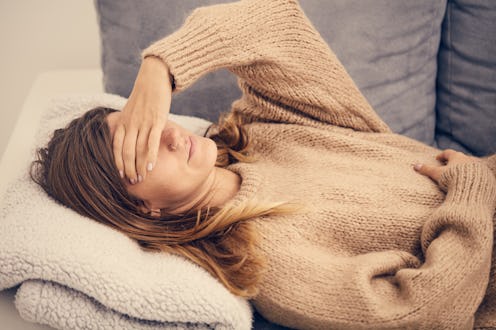
When you're feeling tired during the day — and coffee just isn't doing the trick — sometimes it's best to give in and take a quick nap. Whether you're climbing into bed, or taking a snooze on the couch, getting a few minutes of shuteye can help you feel more alive. But it's important not to go overboard, since napping for more than 20 minutes can actually be detrimental to your health.
"Short power naps can give your brain a boost, allowing you to better problem solve, concentrate, and make decisions," Chris Brantner, sleep expert and founder of SleepZoo, tells Bustle. But anything longer than that has the potential to seriously mess with your day — and possibly even leave you feeling worse than before. "Once you hit the 30 minute mark, you run the risk of experiencing sleep inertia," Brantner says. "This is when you awake feeling groggy and exhausted, despite having slept."
Cut to that confusing post-nap fog that leaves you feeling unsure about which century you're in. When that happens, it's because you entered a stage of deep sleep that's very difficult to wake from. As Brantner says, "If you nap long enough to enter into slow-wave sleep, you're going to need to sleep through your entire sleep cycle (about 90 minutes) so you can awake during light sleep and feel better."
The problem is, it's rare to have enough time for a full 90 minute nap. But even if we did, sleeping for that long in the middle of the day can often come with its own set of side effects.
"Excessive napping can cause your body's internal sleep/wake rhythm to be knocked off kilter," licensed psychologist Vanessa H. Roddenberry, PhD, tells Bustle. "If you 'snack' on sleep during the day, your body won't be as hungry for it at night." Instead of drifting off at your usual bedtime, you'll lie awake till all hours of the night, wondering why you're unable to sleep.
If this becomes a habit — and you aren't getting the recommended seven to nine hours of deep, restful sleep each night — the lack of sleep can even start to impact your health. "A disruption in [your sleep] cycle will result in fatigue, poor sleep, slow reaction time, and even depression," Dr. Richard Honaker, MD, tells Bustle. Not to mention, poor sleep can also make you more susceptible to illness.
If you can swing it, try to stay awake until your usual bedtime. And then make a pact with yourself that you'll practice good sleep hygiene from here on out. This includes going to bed at the same time each night, sleeping in a cool, dark room, and setting aside all sleep-disrupting gadgets before bed. (No more staring at your phone whilst trying to fall asleep.)
Long nap times aren't great for the average person's sleep schedule, but can be even more detrimental if you have a sleep disorder, since they can further disrupt an already out of whack sleep/wake cycle. "If you are someone who tends to struggle with sleep (for example, you are living with insomnia), daytime naps are usually best avoided since they can reduce sleep pressure and make sleep more difficult that night," Martin Reed, a certified clinical sleep health expert, tells Bustle.
It is OK, however, to take a nap if your sleepiness is putting you in danger. "If you feel as though you might fall asleep involuntarily and you are about to engage in an activity that requires [you to] remain alert (for example, you are about to drive or operate machinery), a brief safety nap is appropriate," Reed says. This may call for a 90 minute or three hour nap, followed by a trip to a sleep health expert to figure out why you can't sleep.
Other exceptions to the 20 minute nap rule? If you're sick or pregnant, "take as long of a nap as you need," Nancy Rothstein, MBA, sleep expert for TONE Networks, tells Bustle. When you're recovering from an illness, or growing a human, your body will need more sleep. So feel free to nap the day away, if that feels right.
Another thing worth consider, is how lengthy naps can lead you to unhealthy habits. For example, if you nap too much and feel sleepy during the day, "this may cause you to overcorrect and make poor lifestyle choices related to your sleep hygiene, like chugging an inordinate amount of coffee the next day to get back on track," Mike Kisch, CEO and co-founder of Beddr, tells Bustle. "This kind of activity can mess with your circadian rhythm, the special 24-hour internal clock that sends signals to our brain that it’s time for sleep."
It's completely fine and safe to take a short nap, if you really need one. But keep a few guidelines in mind. "The best time to nap is during the afternoon lull that occurs around 12 to 2 p.m.," Dr. Sujay Kansagra, Mattress Firm’s sleep health expert, tells Bustle. "Everything that applies to getting good overnight sleep applies to naps as well. To have the best nap, you want a comfortable environment that is cool and free of noise. You should not feel hungry or have lots of caffeine prior to a nap." Having a snack, then taking a nap, can be a great combo.
You'll also want to make sure you're lying flat. As Dr. Kansagra says, "Napping in your chair or in other positions other than lying down can lead to muscle pain and poor sleep." So pull up a bed, set your alarm for 20 minutes, and try to get some sleep.